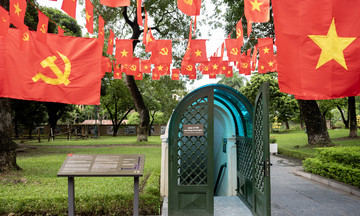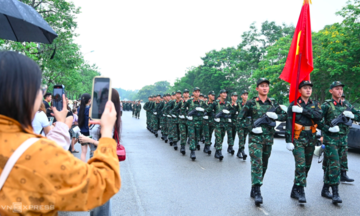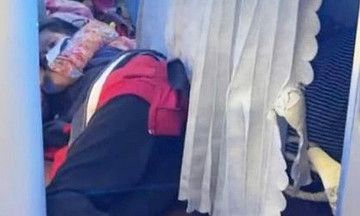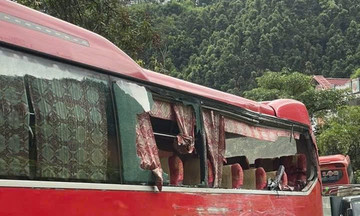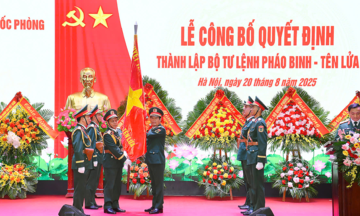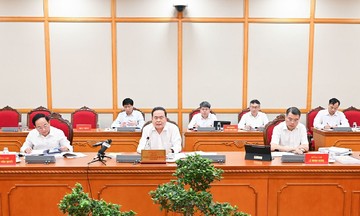World War II (1939-1945) engulfed Vietnam, a nation already under French colonial rule. In 1940, Japan occupied the country, governing through the Nguyen dynasty's court, headed by emperor Bao Dai. In 3/1945, following a coup against the French, Japan installed the Tran Trong Kim government, intending to replace the feudal court. Real power, however, rested with the Japanese military, leaving Bao Dai as a symbolic figurehead.
Meanwhile, the Viet Minh movement, led by Ho Chi Minh, gained widespread support through effective resistance activities. The Tran Trong Kim government, despite efforts to improve public welfare, was hampered by Japanese control and ultimately lost popular support due to its inability to address the prevailing crisis. With Japan's surrender to the Allied forces on 15/8/1945, the government effectively collapsed.
According to the memoirs of Pham Khac Hoe, Bao Dai's private secretary, Prime Minister Tran Trong Kim, while feigning illness and skeptical of Japan's surrender, plotted with his confidants to rely on the returning French colonial power. Some court officials, recognizing the futility of clinging to the throne, began advocating for the emperor's abdication.
Debates within the imperial court intensified in mid-August 1945 as Pham Khac Hoe informed Bao Dai of provinces like Ha Tinh, Quang Ngai, and Phong Dien (Thua Thien) declaring their allegiance to the Viet Minh. In Hue, militia trained day and night, and demonstrations erupted with red and gold starred flags and slogans like "Support Viet Minh" and "Down with Fascism". The mounting revolutionary pressure forced a series of emergency cabinet meetings.
At a meeting chaired by Bao Dai on the morning of August 17, Foreign Minister Tran Van Chuong presented a draft message to the leaders of the US, UK, China, and France, appealing for the protection of independence "won from the Japanese". Interior Minister Tran Dinh Nam proposed including the Soviet Union, citing its role in Japan's unconditional surrender. While supported by Health Minister Ho Ta Khanh, this suggestion was vehemently opposed by Prime Minister Tran Trong Kim and Tran Van Chuong. Bao Dai sided with the opposition, demanding an end to the argument.
Shifting to domestic issues, Nam argued for national unity around the strongest and most active organization, the Viet Minh, to thwart foreign attempts to divide and conquer. He proposed the cabinet's immediate resignation and the transfer of power to the Viet Minh. "In my opinion, even the Emperor should step down," Nam declared, sparking heated debate with Prime Minister Tran Trong Kim.
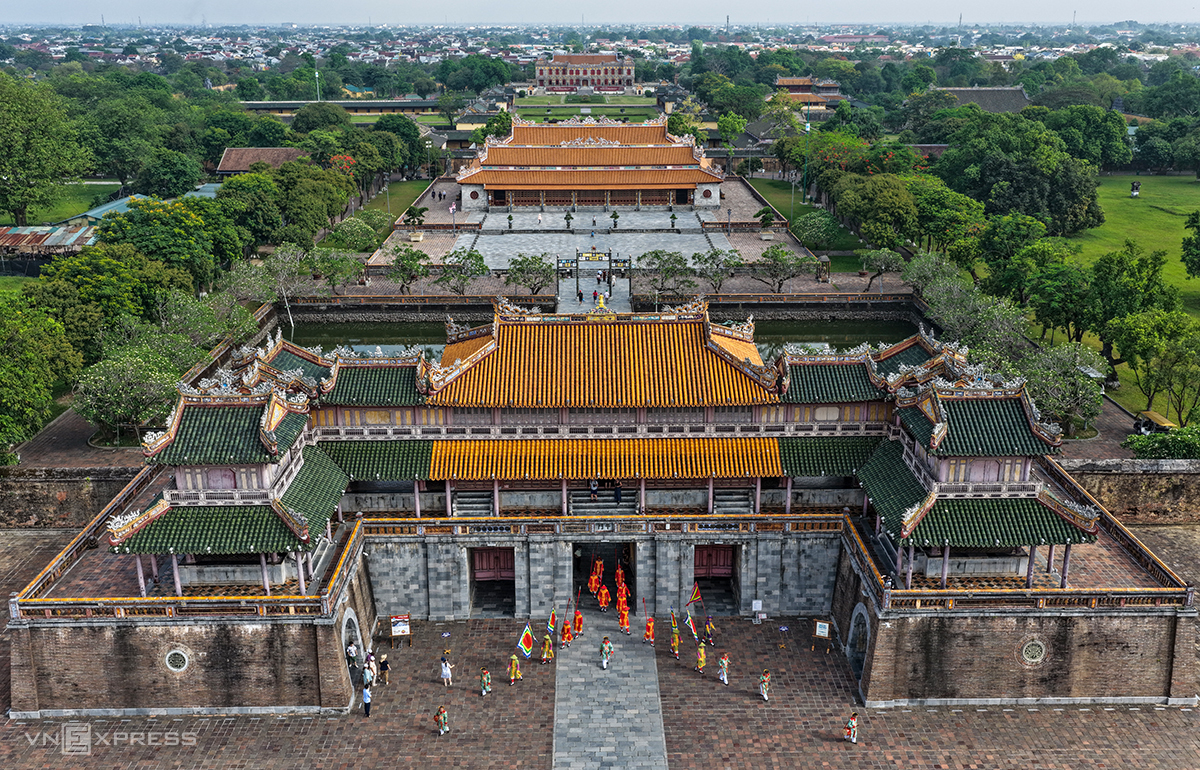 |
Hue Citadel with Ngo Mon Gate in front and Thai Hoa Palace behind, photographed in 8/2025. Photo: Nguyen Dong |
Finance Minister Vu Van Hien argued for a legitimate government to maintain order, engage with the Allies, and prevent the French return. He proposed granting real power to the Viet Minh while retaining the monarchy in form, with a Viet Minh cabinet. This option, after detailed analysis by the ministers who were lawyers, received unanimous cabinet approval.
Pham Khac Hoe drafted Edict No. 105, dated 17/8/1945, outlining the emperor's readiness to transfer power to the Viet Minh and inviting their leader to Hue to form a cabinet. The choice of political system would be left to the people, with the emperor pledging to abide by their will. Bao Dai, believing he would retain the throne, eagerly approved the edict.
Tran Dinh Nam then suggested an imperial proclamation to rally the nation, drafted by Pham Khac Hoe. The proclamation affirmed the nation's commitment to independence, called for patriotic support for the emperor, and highlighted his spirit of sacrifice. It included the line, "I would rather be a citizen of an independent country than a king of a enslaved one." Initially pleased with the line, Bao Dai hesitated when Hoe presented the draft, seemingly conflicted. He eventually signed, but remained uncertain about the Viet Minh leader's identity and the future of the monarchy.
Hoe recounted the Nghe Tinh prophecy: "Dun Son disintegrates, Bo Dai broadcasts, Nam Dan gives birth to a saint," associating the saint with Nguyen Ai Quoc (Ho Chi Minh). Intrigued, Bao Dai asked, "Are you advising me to abdicate, ceding power to the Viet Minh?" Upon Hoe's confirmation, the emperor declared his willingness if the Viet Minh leader was indeed Nguyen Ai Quoc.
On the afternoon of 22/8, Viet Minh activists replaced the imperial flag atop the Ngo Mon Gate with the red and gold starred flag. Bao Dai was dismayed by the lack of guards and the defection of imperial soldiers to the Viet Minh. His attempts to negotiate the flag's return, seeking to preserve the court's dignity, failed.
On the morning of 23/8, the Viet Minh issued an ultimatum, demanding the handover of imperial troops and all equipment, weapons, and ammunition to the revolutionary government. Bao Dai was also to order all provincial governors to transfer power to the Viet Minh by 1:30 PM. Despite arriving early, the letter reached the emperor near noon. Frustrated, he retreated to his chambers, declaring, "Let them do as they please." Hoe urged calm and convened an emergency cabinet meeting to address the ultimatum and the draft abdication decree.
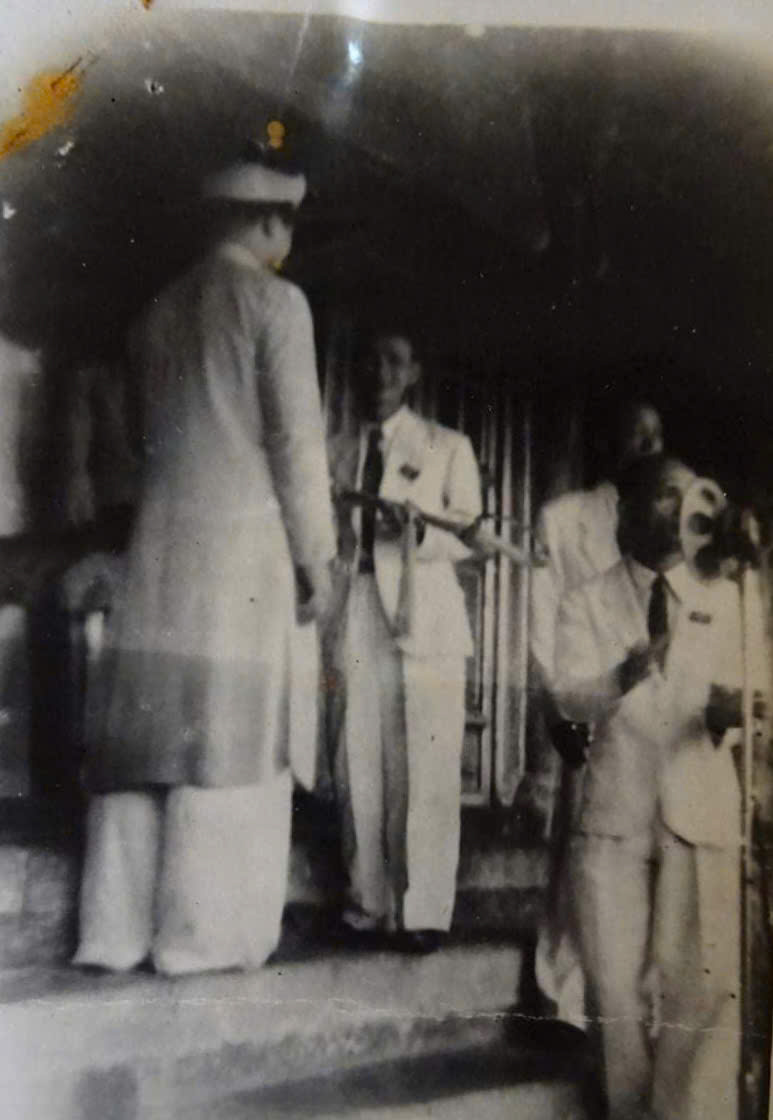 |
Emperor Bao Dai hands over the imperial seal and sword to a representative of the Provisional Government at Ngu Phung Pavilion, afternoon of 30/8/1945. Photo: Hue City History Museum |
The cabinet accepted the Viet Minh's terms. Regarding the abdication decree, only Interior Minister Tran Dinh Nam suggested replacing the phrase "internal conflict" with "North-South division" for a more dignified tone. The amendment was approved.
Concluding the meeting, Prime Minister Tran Trong Kim remarked, "Now everything is up to Mr. Hoe and his responsibility; there's no need for a cabinet anymore." This marked the end of the Nguyen dynasty's final cabinet meeting.
Following his decision to abdicate, Bao Dai became more optimistic, discussing his future as a private citizen, planning to cultivate tea and hunt on his B'Lao (Lam Dong) plantation, even promising Hoe a bus franchise.
On 26/8/1945, Bao Dai performed a quiet ancestral ritual at the The Mieu temple, attended by only 4 officials. Two days later, Pham Khac Hoe, on the emperor's orders, inventoried the imperial assets for handover to the revolutionary government.
Upon receiving Bao Dai's invitation to Hue, the Provisional Government dispatched Tran Huy Lieu, Nguyen Luong Bang, and Cu Huy Can to witness the abdication. "President Ho was still in the liberated zone and hadn't returned to Hanoi," Lieu recounted in his memoirs.
On the morning of 29/8, Hoe welcomed the government delegation at Hue Stadium. They met at the Hue People's Committee, agreeing on the terms: the emperor would relinquish power, leave the citadel, retain personal property (including real estate in his name), and enjoy citizen's rights. Tombs and temples would be preserved by the state, with access granted to the royal family for ancestral worship.
That afternoon, Bao Dai received the delegation at Kien Trung Palace. Before the meeting, the delegates agreed on their demeanor and address, choosing to avoid arrogance despite their victory. "We debated the form of address. Would we still call Bao Dai 'Your Majesty'? Would he still use the royal 'we'? We decided to address him as 'sir' and use 'we' for ourselves, leaving his self-address to him," Lieu recounted.
Bao Dai, dressed in a turquoise ao dai and bareheaded, greeted the delegation in the reception room. After exchanging bows, they sat down to talk, and Pham Khac Hoe excused himself. Bao Dai used "I" instead of the royal "we" and addressed the delegates as "sir". Tran Huy Lieu reiterated the morning's agreement, praising the emperor's patriotism, fostering a cordial atmosphere. When asked about his burdens on the throne, Bao Dai replied, "As long as I remain on the throne, I am exploited by the French."
They agreed on a public abdication ceremony at Ngo Mon Gate on the afternoon of 30/8.
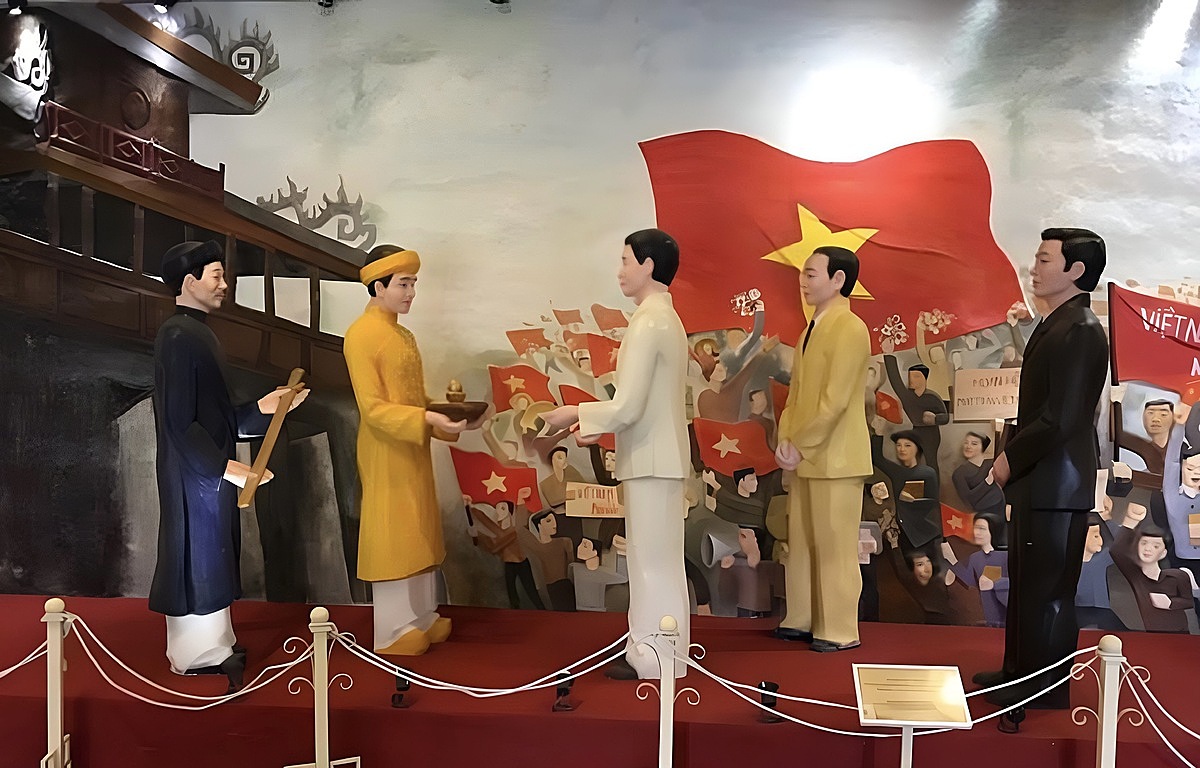 |
A model of Emperor Bao Dai's abdication ceremony, once displayed at the Hue City History Museum. Photo: Duc Loc |
On the morning of 30/8, Hue was awash with red and gold starred flags. Tens of thousands gathered at Ngo Mon Gate, filled with anticipation and solemnity. Before the ceremony, the Provisional Government ordered the temporary lowering of the red and gold starred flag to raise the imperial flag.
At 4 PM, Bao Dai appeared at Ngu Phung Pavilion in yellow attire, his expression calm but heavy. "In a moving voice, the emperor read his abdication decree over the radio. The crowd listened in silence to the words of a king about to become a citizen," Lieu recalled.
Tran Huy Lieu, on behalf of the Provisional Government, accepted the decree, the imperial seal, and the jeweled gold sword – symbols of imperial power. A volley of gunfire marked the moment. The imperial flag was lowered, and the red and gold starred flag rose amidst thunderous cheers.
Poet Cu Huy Can recalled the surprising weight of the imperial seal (the Hoang De Chi Bao seal, cast in 1823, weighed almost 11 kg). The jeweled sword, in its gold-plated silver sheath, revealed a rusted blade when drawn.
Tran Huy Lieu declared the end of the monarchy in Vietnam, outlining the Provisional Government's policies. Bao Dai requested a red and gold starred badge, which was pinned to his chest. He was now Vinh Thuy, a citizen of the Democratic Republic of Vietnam.
Departing, Lieu observed Vinh Thuy's cheerful demeanor. Crowds continued to march along the Perfume River, chanting slogans: "Long live the democratic spirit of citizen Vinh Thuy / Long live the representatives of the Provisional Government / Long live the Democratic Republic of Vietnam".
Nguyen Duc Loc, director of the Hue City History Museum, noted that the story of Bao Dai's abdication remains preserved through signage, exhibitions, books, and memories, transforming Ngo Mon Gate into a symbol of national independence. "This event demonstrates the power of national unity, the principles of people's war, and provides a valuable lesson," he stated.
Nguyen Dong
References:
- The Imprint of the August Revolution of 1945, National Political Publishing House
- From the Hue Court to the Viet Bac Resistance Base, Pham Khac Hoe, Thuan Hoa Publishing House



